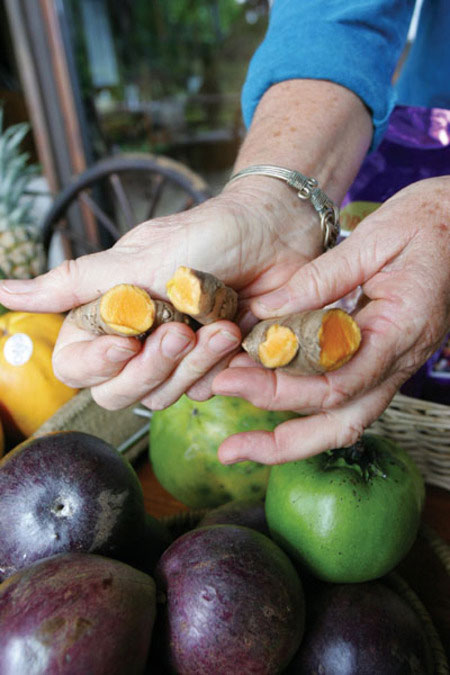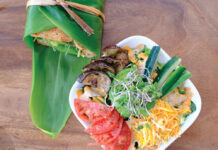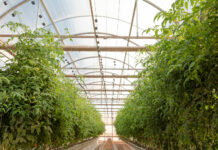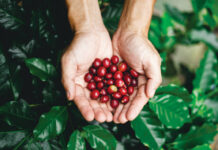By Shannon Wianecki | Photography by Jason Moore
 Chuck Boerner eyes the waves while we talk. They’re small, but glassy and getting better. He and his wife, Lily, own Ono Farms, the largest tropical organic fruit farm in the state. You’d expect three decades of toiling in the soil might have slowed this couple down; far from it. They just returned from Ethiopia, where they taught African farmers how to prune coffee trees for bigger yields. And at 60-something, Chuck seems bent on adding to his two recent surfing titles. If this is retirement for organic farmers, sign me up.
Chuck Boerner eyes the waves while we talk. They’re small, but glassy and getting better. He and his wife, Lily, own Ono Farms, the largest tropical organic fruit farm in the state. You’d expect three decades of toiling in the soil might have slowed this couple down; far from it. They just returned from Ethiopia, where they taught African farmers how to prune coffee trees for bigger yields. And at 60-something, Chuck seems bent on adding to his two recent surfing titles. If this is retirement for organic farmers, sign me up.
Ono Farms is located on a sliver of private land hedged on both sides by Haleakala National Park in tiny Kipahulu: population 300. The farm may be off the grid, but it’s on the cutting edge. According to the U.S. Department of Agriculture (USDA), organic farming is one of the nation’s fast-growing agricultural markets. Retail sales of organic products have grown steadily by 20 percent annually over the past decade, with fresh produce leading the way.
Growth is business as usual at Ono Farms. Sprawling acres of mango and avocado trees are interwoven with rambutan, chocolate sapote, and dragon fruit cactus. Lily Boerner calls the farm “a love affair that kept going for 50 acres.
“Backyard fruit trees have always been a tradition in Hawai‘i,” she says. “Ours turned into a forest.” No tidy rows here; workers navigate the tangle of trees on ATVs, rather than on the big machinery used in conventional fields. While harvesting can be labor-intensive, the Boerners think it’s well worth it. “A forest sustains itself,” Lily explains. “The diversity seems to be giving the trees food. The amount of inputs we have to use is getting less and less.”
Fewer inputs, such as water and fertilizer, mean more profits—good news for an organic farm that strives to keep both the bankbook and the environment in balance. Unlike conventional farmers, organic farmers manage their crops without pesticides or synthetic chemicals. Farms seeking organic certification must follow strict USDA protocols for three years before applying, and pass a third-party inspection. Once certified, organic farms can command premium prices for their products. As a founding member of Hawai‘i Organic Farmers Association (HOFA), the certifying body for the South Pacific, Chuck Boerner knows the certification process inside-out. But for many like the Boerners, organic farming is more than a business; it’s an all-round healthy lifestyle.
Four times a week the Ono Farms van hits Hana Highway at 3:30 a.m. to deliver plump, pesticide-free fruits to the swap meet, fruit stands, hotels, restaurants, and even households islandwide. “It’s a full-service business,” Chuck Boerner says. He caters to local customers who’ve bought from him for years—handpicking favorites for his regulars. Afterwards, he hits the waves at Hamoa; he says he planned it this way when he started farming 30 years ago.
Designing a business around a remote surf break may sound a tad crazy, but Ono Farms has benefited from being off the beaten path. Boerner calls the isolation “priceless.” He credits the locale with shielding his crops from costlier concerns: disease and contamination. Banana bunchy top and papaya ringspot virus haven’t yet found their way to Kipahulu. Protected from pollen drift, Ono Farms claims to grow some of the last GMO-free papayas in the state. Remaining free of GMOs (genetically modified organisms) is critical to maintaining a farm’s organic status.
I ventured out to the organic Eden for a fruit-tasting and farm tour—a new source of revenue for the farm. “It’s like a fruit-and-coffee cocktail party,” says Lily, pulling a tray of freshly roasted coffee and cocoa beans from an old black Wolf range in her farmhouse. A cornucopia of fruit awaits sampling out on the lanai. Dark purple star apples nestle beside mango, banana, and a pile of raw chocolate. I feel like an Old World explorer as my tongue interprets one novel flavor after the next. ‘Ono, Hawaiian for delicious, is right.
The tasting continues as we tour the grounds. We pass under a tree with a patch cut into its trunk revealing dark orange flesh: cinnamon. I can’t resist pressing my nose to the spice-scented bark and rubbing my hands against it. Deeper in the forest-farm we find cashew, heart of palm, and cocoa, whose weird fruits hang like a witch’s warts from the trunk. Wild pumpkin crawls beneath a maze of bananas.
She describes working with coffee farmers in Ethiopia—organic by necessity. “They didn’t want to prune even one branch, because it means the difference between eating and not eating for them,” she says. Inspired by their eventual success in teaching pruning to the Ethiopian farmers, the Boerners returned home and applied the same techniques to their entire farm with renewed vigor. Ahead of us, a mountain-apple tree sags under pale yellow fruits blushing scarlet at the tips. A branch has broken beneath the weight. “Pruning isn’t easy,” she admits.
Being off the grid hasn’t been without problems. A solar dehydrator next to the fruit-packing shed stands empty. Years ago, the county shut down the farm’s dried-fruit operation because of a technicality with the water source.
Chuck shrugs off setbacks. “Farming is very forgiving,” he says. “You don’t lose the farm because you lose a crop—if you’re diversified.” That’s a fairly big “if” in the United States, where monocrops—huge fields devoted to a single crop—are standard. Ono Farms relies on a well-diversified portfolio. Bananas constitute the blood of the business, while exotic fruits are resort favorites. A line of tropical jams and jellies is in the works. Farm tours and consultations offer further revenue.
The farm employs nine, if you include Chuck’s mother, Gertrude Boerner. The 95-year-old oversees the farm’s Hana fruit stand once a week. The whole family pitched in, planting an upper-field orchard of bananas that spells out “Ono”—visible from the air. “If we get too many helicopters buzzing over, we’ll let it grow in,” says Chuck. This kind of whimsy, atypical in the business world, seems to fuel the success of Ono Farms.
“We were an agrarian society just 50 years ago,” says Lily. “Now we’re 1 percent of the population. They’re going to take us off the U.S. Census. We feel it’s our obligation to perpetuate farmers.” Those who imagine farming has to be a backbreaking way to make a living might take a spin around Ono Farms to experience just how delicious a farmer’s life can be.
Visit www.onofarms.com.





